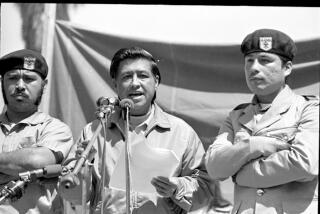Philippine Court Orders Aquino Plantation Seized
- Share via
MANILA — A Philippine court has ordered the government to seize the sugar plantation owned by the family of presidential candidate Corazon Aquino for alleged failure to obey land reforms, family associates disclosed Sunday.
Aquino called the order “political harassment” by President Ferdinand E. Marcos.
News of the court order on the 16,000-acre Hacienda Luisita came as confusion, charges of fraud and a low turnout marred compulsory registration of voters for the early presidential election scheduled for Feb. 7.
Aquino campaigned Sunday through the main island of Luzon.
Marcos prepared for a rally in the U.S. military base city of Olongapo, 50 miles west of Manila, by issuing a statement attacking politicians who want to abrogate the treaty permitting U.S. military bases in the Philippines.
The court decision on the Aquino plantation was turned over to the Ministry of Agrarian Reform on Dec. 3, one day after Aquino announced that she would challenge Marcos, Aquino aides said. Legal sources said Sunday that an appeal was filed Dec. 21 with the Intermediate Appellate Court.
6,000 Farm Workers
Situated on prime agricultural land 65 miles north of Manila, the hacienda is the country’s second-largest sugar plantation, encompassing several villages and farmed by 6,000 workers. It is believed to provide a major part of Aquino’s family’s wealth.
Aquino is treasurer of the trading company Jose Cojuangco and Sons Inc., and its subsidiary, the Tarlac Development Corp., which owns the hacienda. It was purchased in 1958 by her father, Jose P. Cojuangco, from a Spanish concern.
Legal sources said that when Cojuangco bought the land, a contract with the Government Service Insurance System and the Central Bank made the deal conditional on the parceling of land if there are tenants and if there is agrarian unrest.
In the recent court case that Aquino’s family lost, the government argued that the contract had been breached because the land had not been divided.
Cojuangco attorneys replied that the laborers are not tenants but workers belonging to the United Luisita Workers Union. They also said Marcos has exempted sugar plantations from land reform in order to maximize production of sugar, a vital Philippine export.
Marcos has criticized Aquino, the widow of his slain political rival Benigno S. Aquino Jr., for her alleged silence on land reform. He has warned that her election might lead to a restoration in this former Spanish and American colony of a feudal system of land ownership that Marcos claims to have abolished.
Called Old Issue
Aquino said Sunday that the land reform case “is an issue that has been around for nearly 18 years, which Marcos obviously revives whenever it suits him politically and is clearly used for political harassment.”
She said she is “committed to genuine land reform.”
The charges over the hacienda came as officials of the National Citizens Movement for Free Elections said that fewer than half the estimated 3 million people required to register turned out. As many as 3 million Filipinos aged 18 and over who did not vote in the 1984 parliamentary polls were required to register or face a $5 fine.
The low total stemmed in part from a requirement that each voter submit four identification photos. Many could not afford the 63 cents for the pictures, and in some remote areas photographic facilities were unavailable.
More to Read
Sign up for Essential California
The most important California stories and recommendations in your inbox every morning.
You may occasionally receive promotional content from the Los Angeles Times.













